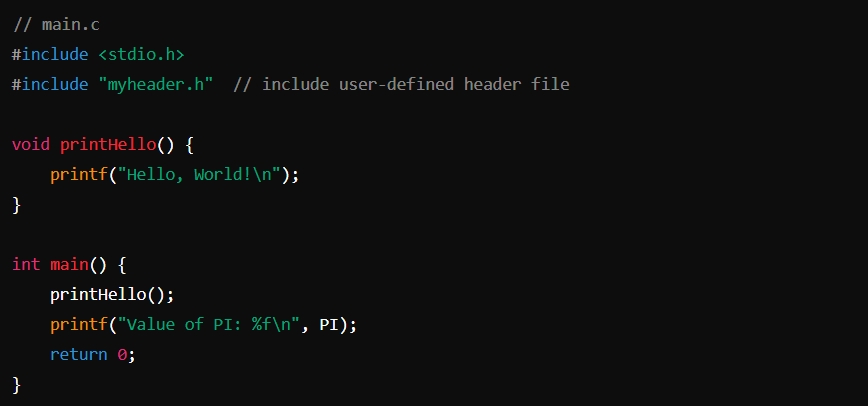Program Structure
The program structure in C refers to the organization and arrangement of the various components and elements that make up a C program. Understanding the typical structure helps in writing, maintaining, and debugging programs effectively. Here’s a detailed explanation of the common elements in a C program:
Basic Structure of a C Program
- Preprocessor Directives
- Global Variable Declarations
- Function Prototypes
- Main Function
- User-Defined Functions
1. Preprocessor Directives :
Instructions processed before the compilation of the program begins, typically used to include libraries and define constants.
2. Global Variable Declarations :
Variables declared outside of all functions, accessible from any function within the program, with file scope and lifetime spanning the entire program execution.
3. Function Prototypes :
Declarations of functions that specify the function’s return type, name, and parameters, informing the compiler about the functions that will be used later in the program.
4. Main Function :
The entry point of the program where execution starts, typically containing calls to other functions and managing the overall flow of the program.
5. User-Defined Functions :
Functions written by the programmer to perform specific tasks, defined after the main() function or in separate files, encapsulating tasks into reusable code blocks.
Key Points
- Preprocessor Directives: Handle library inclusion and macro definitions.
- Global Variables: Provide variables that can be accessed by any function in the file.
- Function Prototypes: Inform the compiler about functions that will be used later.
- Main Function: The entry point of the program, where execution begins.
- User-Defined Functions: Encapsulate tasks into reusable code blocks.
Scope Rules in C
Scope refers to the visibility and lifetime of variables and functions within a program. In C, there are four types of scope:
- Block Scope
- Function Scope
- File Scope
- Function Prototype Scope
Block Scope
- Definition: Variables declared within a block (a set of statements enclosed in braces {}) have block scope.
- Visibility: They are only visible within that block.
- Lifetime: They exist only while the block is executing.
Function Scope
- Definition: Labels (used in goto statements) have function scope.
- Visibility: They are visible throughout the function in which they are defined.
- Lifetime: They exist for the entire duration of the function.
File Scope
- Definition: Variables and functions declared outside of all functions have file scope.
- Visibility: They are visible from the point of declaration to the end of the file.
- Lifetime: They exist for the entire duration of the program.
Function Prototype Scope
- Definition: Parameters in a function prototype have function prototype scope.
- Visibility: They are visible only within the prototype.
- Lifetime: They exist only during the prototype declaration.
Header Files in C
Header files in C provide a way to include declarations of functions, macros, constants, and types that can be shared across multiple files. This helps in modular programming and code reuse.
Creating and Using Header Files
- Creating a Header File:
- Create a file with a .h extension.
- Place function prototypes, macro definitions, constants, and type definitions in this file.

- Including a Header File:
- Use the #include directive to include the header file in your C source files.

Standard Header Files
C provides several standard header files, such as:
- stdio.h : Standard input/output functions
- stdlib.h : Standard library functions
- math.h : Mathematical functions
- string.h : String handling functions
Static Variables in C
Static variables retain their value between function calls and can be used to maintain state information.
Static Local Variables
- Definition: Declared within a function using the static keyword.
- Visibility: Visible only within the function.
- Lifetime: Exist for the entire duration of the program but retain their value between function calls.
Static Global Variables
- Definition: Declared outside of all functions using the static keyword.
- Visibility: Visible only within the file they are declared in (file scope).
- Lifetime: Exist for the entire duration of the program.
Summary
Scope Rules
- Block Scope: Variables are visible only within the block they are declared in.
- Function Scope: Labels are visible throughout the function they are declared in.
- File Scope: Variables and functions are visible from their declaration to the end of the file.
- Function Prototype Scope: Parameters are visible only within the function prototype.
Header Files
- Provide declarations of functions, macros, constants, and types.
- Facilitate modular programming and code reuse.
- Use #include to incorporate them into source files.
Static Variables
- Static Local Variables: Retain value between function calls, visible only within the function.
- Static Global Variables: Visible only within the file they are declared in, retain value for the program’s duration.